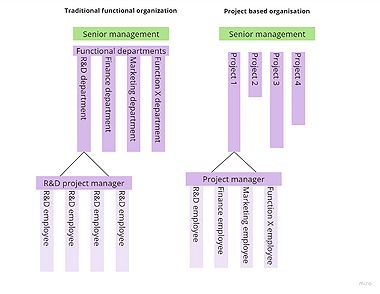Project based organisations
Contents |
Big Idea
What are project based organisations?
Project based organisation (PBO) is an organisational structure where projects are the main driver of business. In a pure project based organisation the project manager will have control over all functions of the project, with only senior management to refer to. This means that the functional units, ie. R&D, finance, marketing etc. are integrated in each project in the PBO instead of going across multiple projects. Furthermore, because projects are the main driving force, each project organisation structure looks different. This is because projects drive the business and therefore also shapes the organisational structure. Figure 1 illustrates that projects are the driving force of the project based organisation, whilst the functional units and their expertise is the driving force of a functional unit, they are respectivly in the top of the organisational diagram. Furthermore it illlustrates how in the PBO, the functional units are integrated under each project and that each project in the PBO looks slightly different in the organisational structure, i.e. the functional units may be placed differently and some may be more important to some projects than others. The project based organisation stucture gives the project manager authority over resources. This high level of control that lie with the project managers of each project in the PBO leads to high flexibility within the project. [1]

Why choose a project based organisational structure?
The purpose of introducing a project based organisation is that it has the ability to deal with fast change as well as being proactive to uncertainty and project risk. Furthermore, PBO's have an openness in the organisational structure that makes it easier to work across organisations and include external stakeholders in the project process. Thus the PBO becomes an enabler for co-creation in projects. PBO's are proven to be useful when dealing with complex products or systems where the clients needs may change through the progression of the project as they gain more knowledge. [1]
The PBO terminology
The definition of a project based organisation can be hard to determine. This is because in litterature there are several terms and forms of project based organisations. This is partly because the project based organisation is dependent on context and therefore changes with it, which makes it difficult to define. Furthermore, the PBO can exist as a pure form like described above, but can also be diluted. In the diluted form "in which the needs of the project outweigh the functional influence on decision making"[1].
In the following will be given an overview of some of the terms that can refer to a form of PBO or organisational form that uses similar core principles Cite error: Closing </ref> missing for <ref> tag [1] [2] [3] [4] [5] [6]
Annotated bibliography
Davies, A., Hobday, M., 2005. The project-based organisation, in: The Business of Projects: Managing Innovation in Complex Products and Systems. Cambridge University Press, pp. 117–147. https://doi.org/10.1017/CBO9780511493294.007
This book is a great resource for understanding the core principles of project based organisations. The book is about projects and complex products and systems and suggests a form of PBO for the development of such complex and uncertain systems. In it you will find project management and organisational theories in general with a specific chapter dedicated to project based organisations. Here a case study compares the PBO to a functional organisation.
Cite error:
<ref> tags exist, but no <references/> tag was found